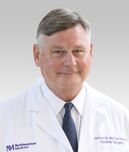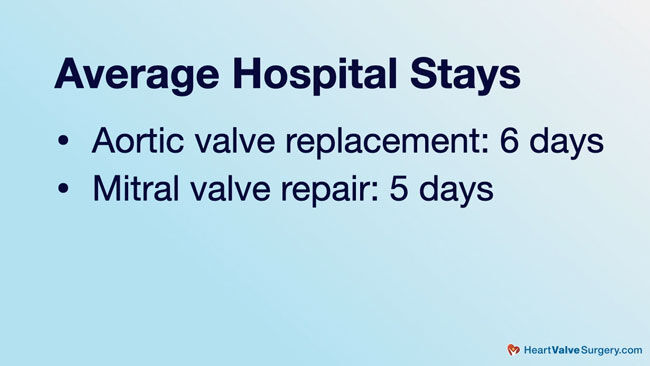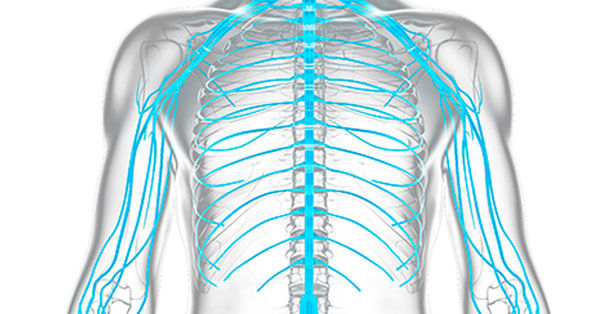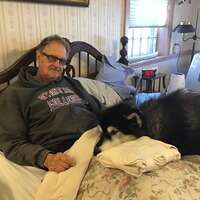Doctor Q&A: What Can Heart Surgery Patients Expect in the Hospital?
Written By: Adam Pick, Patient Advocate, Author & Website Founder
Medical Expert: Patrick McCarthy, MD, Chief of Cardiac Surgery at Northwestern Medicine
Published: April 21, 2022
An excellent question that many heart valve patients have about their upcoming surgical or transcatheter procedure is, “What can I expect during my time in the hospital?”
Given all the recent advances in medical technology specific to patient recovery, I wanted to help patients develop an accurate “set of expectations” about life in a hospital. For this reason, I interviewed Dr. Patrick McCarthy, who is the Chief of Cardiac Surgery at Northwestern Medicine in Chicago, Illinois. During his career, Dr. McCarthy has performed over 10,000 cardiac procedures with more than 6,000 operations involving heart valve repair or replacement therapies. At HeartValveSurgery.com, Dr. McCarthy has successfully treated over 175 patients including Susan King, Lydia Webster and Steve August.
Key Learnings from Dr. McCarthy
In this video interview, Dr. McCarthy shared several important points that I wanted to jot down for patients in our community to consider:
- The time that a patient may spend in the hospital varies greatly given the type of procedure and the overall health of the patient.
 Dr. Patrick McCarthy
Dr. Patrick McCarthy
- For surgical aortic valve replacement (SAVR) procedures, Dr. McCarthy’s research shows that patients are in the hospital for six days on average. For a surgical mitral valve repair procedure, patients can expect to be in the hospital for five days.

- For transcatheter procedures, including transcatheter aortic valve replacement (TAVR) and transcatheter mitral valve repair (e.g. MitraClip), many patients are now being discharged the day after the procedure.
- During Dr. McCarthy’s career, he has witnessed a major evolution specific to hospital duration for heart surgery patients. “I can’t tell you how much it’s evolved. It’s so remarkable where we are in 2022 compared to way back in 1980s when I began as a young intern,” states Dr. McCarthy. “Back in those days, patients would frequently be in the hospital for about 10 or 14 days. The breathing tube would stay in overnight in every single patient, even the most simple patient. We have evolved and improved things so much. I didn’t mention it. But, a lot of our ‘Fast-Track Patients’ go home on Day 3. It’s just remarkably better.”
- Patient comfort and pain management within the hospital is a key focus for Dr. McCarthy and his team at Northwestern Medicine.
- The use of “nerve blocks” has greatly diminished the pain experienced by patients. “We’re doing things like nerve blocks in the operating room before the patient is really even woken up so that they wake up and they don’t have much pain,” states Dr. McCarthy. “On a scale up to ten where ten is the worst pain you’ve ever had, many of my patients say the first day is the hardest at a pain level of three or four. But, by the next day, it’s more like a two.”

- Nerve blocks can also help patients avoid the use of narcotics which can make patients feel drowsy and extend recovery time. This further reduces our current social struggle with the opioid crisis here in the United States.

- Following surgery, there are several milestones that a patient will experience at Northwestern Medicine prior to discharge including, but not limited to, removal of the breathing tube, sitting-up in a chair, removal of the chest tubes, walking in the hallways, and practicing going up-and-down stairs with a physical therapist.
- Dr. McCarthy suggests that patients may want to bring their own robe to the hospital, their phone and their phone charger (which patients often forget). All of the toiletries are provided by Northwestern Medicine to its patients.
- The ability for the care partner of a patient (e.g. spouse, partner, child) to stay overnight in the hospital is different at many hospitals. At Northwestern Medicine, a couch that folds out in the patient’s room is provided to care partners so they can spend the night in the hospital. However, it should be noted that COVID protocols within hospitals may impact visiting hours and the ability of a patient to stay overnight.

- According to Dr. McCarthy, patient expectations of what might happen in the hospital is often much worse that it truly is. Doctor McCarthy states, “I think the thing that patients should understand is that many times the hospitalization is not nearly what they thought that it was going to be. It’s a lot smoother. Patients are not having as much pain as they may have heard from someone who went through an operation 30 years ago. A lot of the information that is out there is not necessarily accurate. It’s just been a really remarkable and gratifying evolution to see how much easier this is on our patients and to have them be able to recover and go home.”
Many Thanks Dr. McCarthy & Northwestern Medicine
On behalf of our patient community, many thanks to Dr. Patrick McCarthy for taking the time to share his clinical experience and research with us. And, many thanks to Northwestern Medicine for taking great care of the HeartValveSurgery.com patients.
Related Links:
- Research Alert: Is Early Surgery Recommended for Asymptomatic Mitral Regurgitation Patients?
- Emergency Aortic Valve & Aneurysm Surgery
- Which Operation Did Bicuspid Aortic Valve Patient, Jim, Get – TAVR or SAVR?
Keep on tickin!
Adam
Video Transcript
Adam Pick: Hi, everybody. It’s Adam with heartvalvesurgery.com. Today we’re answering your questions all about what patients can expect in the hospital. I’m thrilled to be joined by Dr. Patrick McCarthy who’s the chief of cardiac surgery at Northwestern Medicine in Chicago, Illinois. During his extraordinary career, Dr. McCarthy has performed over 10,000 cardiac procedures of which more than 6,000 involved some form of heart valve repair or heart valve replacement. Dr. McCarthy, as always, it is great to see you again. Thanks so much for being with us today.
Dr. McCarthy: Thanks, Adam. Always a pleasure to talk to you and be here with heartvalvesurgery.com.
Adam Pick: Yeah, and so, Dr. McCarthy, let’s answer a question that I get three to four times a week. I imagine you get it all the time when you’re seeing patients, which is how long will a heart valve patient be in the hospital?
Dr. McCarthy: That’s a great question, Adam. Literally, I answer that one every day. It’s something important your patients should really ask their doctor beforehand because I can’t answer it until I’m sitting there talking to the patient. It depends on how old they are, how complex the operation is and so on. I’ll give you a sense of the national data. If someone is undergoing an aortic valve replacement, pretty straight forward, they may expect about six days in the hospital. If they’re undergoing a mitral valve repair, they might expect about five days. Now, that can vary a lot depending on the level of complexity of the surgery and the overall condition of the patient.
Adam Pick: Dr. McCarthy, I’ve got to ask. How has that changed during your career?
Dr. McCarthy: Adam, I can’t tell you how much it’s evolved. It’s so remarkable where we are 2022 compared to way back in 1980 when I began as a young intern. Back in those days, patients would frequently be in for about 10 or 14 days. The breathing tube would stay in overnight in every single patient, even the most simple patient. We have evolved and improved things so much. I didn’t mention it but even a lot of our fast-track patients go home Day 3 these days. It’s just remarkably better.
Adam Pick: Dr. McCarthy, are there any medical advances that have shortened the stay of patients in the hospital?
Dr. McCarthy: Really, things have evolved, especially with transcatheter approaches, so transcatheter aortic valve replacement, or TAVR, a lot of those patients are going home the day after the procedure or maybe two days later. Many of those are being put in patients that are elderly and frail. Those are the patients that in the past we would have been expected to have to stay in the hospital a long time. Furthermore, not just are they going home, but they’re going home, not just out of the hospital, but home. In the old days, just to recovery from open heart surgery, many of those patients might have to go to skilled nursing or some such facility. Now we’re also seeing it happen with mitral valve surgery, with mitral clip and transcatheter treatments for mitral and tricuspid disease. Again, it’s been remarkable the amount of improvement that we have been seeing.
Adam Pick: Dr. McCarthy, I also get questions about comfortability of patients in the hospital. Is there anything that you and your team at Northwestern Medicine are doing to help patients be more comfortable?
Dr. McCarthy: Really, we focus a lot on patient comfort. I think that’s been the secret sauce and part of the reason that patients are going home early. If you think of the transcatheter approach, they don’t really have an incision and so patients can recover quicker without pain and go home earlier without pain. We’re doing things like nerve blocks in the operating room before the patient is really even woken up so that they wake up and they don’t have much pain.
On a scale up to ten where ten is the worst pain you’ve ever had, many of my patients say the first day is the hardest is a three or four, but by the next day, it’s more like a two. We’re very focused on reducing the patient’s pain and making them more comfortable. The other is we try to avoid narcotics. When they’re not having a lot of pain and they don’t need narcotics, that makes a difference because the narcotics cause them to be drowsy and it makes it difficult for them to recover.
Adam Pick: Dr. McCarthy, I love hearing about the comfortability that you and your team at Northwestern Medicine are providing for patients. I’m curious to know if you can answer a question that I get all the time, which is what should I expect while I’m in the hospital?
Dr. McCarthy: That’s a great question, Adam. Just to sketch it out for them in a typical patient, these days, we remove the breathing tube in the operating room in most of the patients with heart valve surgery so they don’t even remember it, otherwise, shortly after they arrive in the intensive care unit. Again, they usually don’t remember it. Oftentimes, that night they may already be out of bed sitting in a chair. The next morning, at least, they’re sitting in a chair and walking. The chest tubes come out which is another big step forward because some people have discomfort from the chest tube. Then typically that day they go up to the regular nurse floor. Then it becomes walking in the hallway and then they get tested going up and down stairs with physical therapy. They just get stronger and get their medicines adjusted. Then it’s time to give them their discharge instructions and it’s time to go home.
Adam Pick: Dr. McCarthy, another question I get is, what should I bring to the hospital?
Dr. McCarthy: Adam, people ask about what they bring to the hospital. Usually, Janet, my nurse, is the one that goes over a lot of that with them. I can tell you what they sometimes forget, though, which is their phone and their charger, especially their charger. They need to be reminded about that. Some people have sleep app for sleep apnea and they have their own personalized mask and so that’s a good thing to do. Obviously, we have toiletries and most people will bring a robe or two. Just hospital gowns are not designed for fashion.
Adam Pick: Dr. McCarthy, another question I get about the hospital is, can my care partner, maybe it’s my spouse, or my son, or my daughter, stay with me in the hospital?
Dr. McCarthy: Adam, it depends on what hospital they’re in. I don’t know that any hospital has allowed them to stay in the intensive care unit. I don’t recall ever seeing or hearing of that, but once they leave the intensive care unit, so for instance, here at Northwestern, we actually have a couch that folds out and so their care partner can stay with them. Obviously, all of those rules evolved through the pandemic, although, fortunately, those have become much looser. Visiting hours are returning to normal.
Adam Pick: Dr. McCarthy, given all the patients that you’ve helped over the years, what else should patients think about when they’re getting ready to come to the hospital for surgery?
Dr. McCarthy: Adam, I think we covered all of the high points. I think the thing that patients should understand is that many times the hospitalization is not nearly what they thought that it was going to be, that it’s a lot smoother, and that they’re not having as much pain as they may have heard from someone who went through an operation 30 years ago or something. That a lot of the information that is out there is not necessarily accurate. It’s just been a really remarkable and gratifying evolution to see how much easier this is on our patients and to have them be able to recover and go home and act like that wasn’t so bad.
Adam Pick: Dr. McCarthy, as always, thanks so much for sharing these insights with the patient community at heartvalvesurgery.com. I just want to extend a huge thank you to you and the entire team at Northwestern Medicine in Chicago for being so supportive of our community over the years. Thanks again.
Dr. McCarthy: Thanks, Adam. Thanks for all that you do for the patients and for the community. There’s so many hundreds of thousands of patients now that you have educated with your reach. It really is – we’re just so happy to see that you’ve been able to bring people some really accurate information. Thank you.
Adam Pick: Hi, everybody. It’s Adam. I hope you enjoyed that video. Don’t forget. You could always subscribe to our YouTube channel, watch the next two educational videos coming up on your screen, or click the blue button to visit heartvalvesurgery.com.





